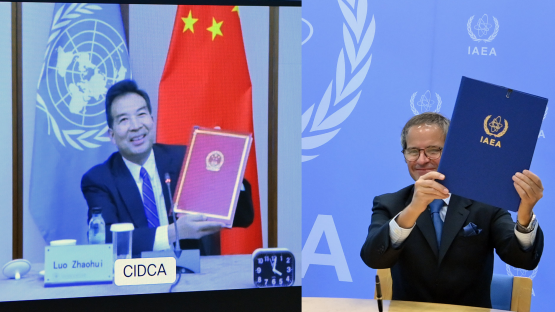An agreement between the IAEA and the China International Development Cooperation Agency (CIDCA), signed on Thursday, will enable the IAEA to leverage China’s wealth of institutional experience to assist developing countries in their attainment of the Sustainable Development Goals (SDGs). It is the first time the IAEA signs a Memorandum of Understanding (MoU) with a national overseas development agency and will strengthen South-South and triangular cooperation.
Signed by IAEA Director General Rafael Mariano Grossi and Chairman of the CIDCA Luo Zhaohui, the agreement covers a five-year period from 2021 to 2026. The two entities will pursue cooperation in applied research and development and capacity building, including education and training at the graduate and post-graduate levels. The IAEA and CIDCA will exchange expertise and knowledge, and support networking and the placement and participation of training candidates from developing counties. The two organizations will also cooperate in the provision of expertise to support the development of technical infrastructure in the peaceful uses of nuclear applications in developing countries. Finally, the agreement is also expected to support the implementation of the IAEA’s newest initiatives, NUTEC Plastics and Zoonotic Disease Integrated Action (ZODIAC).
“This is a historic occasion because, for the first time, the IAEA and China’s Development Agency are joining forces to help people in need,” Mr Grossi said. “This Memorandum provides us with an opportunity to leverage our respective strengths, with the goal of supporting development and socioeconomic impact.”
Luo Zhaohui, Chairman of CIDCA, said, “The current international conditions, caused by the spread of COVID-19, have had profound effects on us all, in developed and developing countries alike. Our focus must now be on international development.”
CIDCA is hosted within China’s State Council and was established in April 2018 to support both South-South cooperation and the attainment of the global targets outlined by the Sustainable Development Agenda. Common areas of interest already identified by the parties include sustainable agriculture and food production, as well as zoonotic disease detection.
“Chinese President Xi Jinping proposed the Global Development Initiative (GDI) at the 76th UN General Assembly, calling upon the international community to prioritize development, to embrace the people-centred core concept and to achieve harmony between man and nature,” explained Ambassador Wang Qun, Permanent Representative of the People’s Republic of China to the United Nations and other Vienna-based international organizations. “The signature of today’s MoU between CIDCA and IAEA is a concrete step taken in the overall context of China’s implementation of the GDI.”
It has been more than 70 years since China first launched its foreign aid and international development programme—first through its Department of Foreign Aid, and beginning in 2018, through CIDCA. Since then, China has provided aid to over 160 developing countries, implementing thousands of projects and training more than 400 000 experts throughout the developing world.








